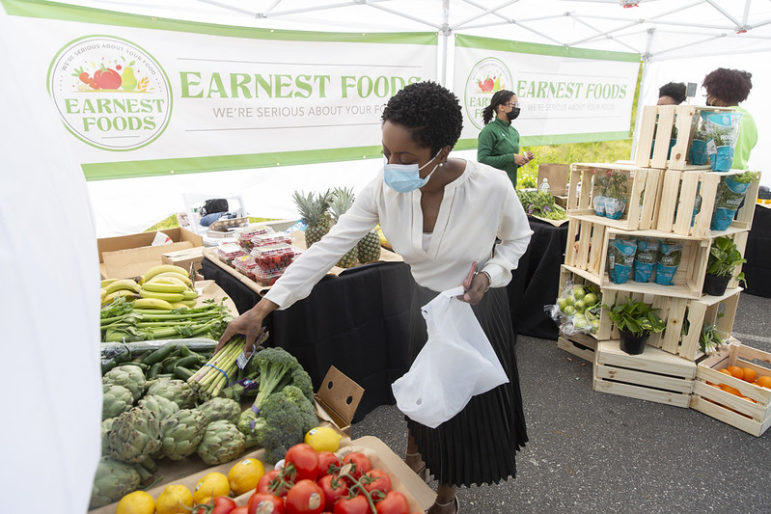Less than three months after winning New York City’s first true test of ranked-choice voting, Councilmember Selvena Brooks-Powers is back on the ballot, this time to defend her seat against two former foes in Queens’ District 31.

NYC Council/John McCarten
Councilmember Selvena Brooks-Powers at the opening of a farmers market in her Queens district.
Council Countdown is a partnership of City Limits, City & State, Gotham Gazette and the Queens Daily Eagle, offering coverage of the 2021 New York City Council races.
Less than three months after winning New York City’s first true test of ranked-choice voting, Councilmember Selvena Brooks-Powers is back on the ballot, this time to defend her seat against two former foes in Queens’ District 31.
Brooks-Powers, the former head of Minority and Women-owned Business Enterprise contract compliance at the JFK Airport redesign, held a narrow lead in the special election and achieved a majority after eight rounds of balloting — the process by which candidates with the lowest vote total are eliminated and their totals reallocated to voters’ back-up choices. The race was New York City’s first experience with ranked-choice voting after a candidate won with a first-ballot majority in a special election three weeks earlier.
Brooks-Powers was sworn in on March 18, nearly a month after constituents headed to the polls. She replaced Donovan Richards, who vacated the seat after his election as borough president last year.
Two other candidates from that February special are also back in the mix in the June primary: Nancy Martinez, the founder of a home health aide training agency; and Nicole Lee, an advocate for the rights of disabled New Yorkers.
Since taking office, Brooks-Powers has been appointed to nine Council committees, including Transportation and Health, roles that deal with core issues for her constituents. Council District 31 spans part of Southeast Queens, where public transit rides into Manhattan can surpass two hours, as well as Far Rockaway and nearby neighborhoods in the eastern portion of the Rockaway Peninsula.
The district’s lone hospital, St. John’s Episcopal, was stretched to capacity by the COVID-19 pandemic, which delivered a disproportionate blow to the predominantly Black communities that surround the medical center.
Despite its crucial role treating low-income New Yorkers before and during the pandemic, a state-contracted consultant recommended gutting St. John’s Episcopal and converting the facility into a 15-bed “micro-hospital.” The proposal, first reported by the Queens Daily Eagle, fueled intense backlash among local residents and leaders, including Brooks-Powers.
She says preserving St. John’s Episcopal and establishing another hospital on the peninsula are two of her main focuses as she campaigns for a full term. In an interview, she referenced the destructive impact of a 2005 state report that called for the closure of several New York City hospitals. The Berger Commission, named after its lead author, investment banker Stephen Berger, proposed cutting healthcare costs by specifically shutting down three Queens hospitals, including Mary Immaculate in Jamaica. Seven years after the report, a fourth, Far Rockaway’s Peninsula Hospital, shut down forever.
“Every time I speak to someone, we’re talking about the need for a hospital because it is necessary,” says Brooks-Powers, who once worked at Peninsula. “I feel the Berger Commission report did an injustice to Black and brown communities. We lost Peninsula, we lost Mary Immaculate Hospital.
“People often look at hospitals through the lens of profitability instead of lives lost and saved,” she adds. “I feel it’s a human right in a first-world country that we should be able to have hospitals in our communities.”
Brooks-Powers has received endorsements from many of New York City’s most powerful labor unions, including DC37 and SEIU1199, the Queens County Democratic organization and several influential local elected officials, like Richards, U.S. Rep. Greg Meeks and State Sen. James Sanders — who rarely backs the same candidate as Meeks and the Queens Democrats.
More than two-thirds of District 31 residents are Black, 16 percent are Hispanic, and 11 percent are white, according to U.S. Census data. There is also a large Orthodox Jewish community in Far Rockaway, which turned out for second-place finisher Pesach Osina in the special election.
In addition to public health, public safety has also taken center stage in the lead up to the primary, especially after the murder of a 10-year-old boy inside his Edgemere home earlier this month.
The district overlaps with two police precincts — the 105th in mainland Queens and the 101st on the Rockaway Peninsula. Murders and shootings have both increased in the 105th this year compared to 2020; in the 101st, murders have increased from two to three while shootings have declined, according to NYPD statistics.
“Whatever the numbers are, one shooting is one too many,” Brooks-Powers says. “One death is absolutely one death too many.”
Though overall crime is down significantly in both precincts, the rise in murders has left communities shaken, Brooks-Powers says. She described the importance of a new police precinct coming to the area after years of advocacy by local residents. Mayor Bill de Blasio announced in April that the city would restore funding for the 116th Precinct, while also allocating more than $1 million to violence prevention teams in the 105th.
“To address crime, you don’t give up the conversation about reform,” Brooks-Powers says. “A part of reform is getting to the root causes and I am excited when we were able to expand Cure Violence to the 105th.”
Martinez and Lee did not respond to interview requests for this story, but both have also prioritized public health and public safety, dating back to the special election.
Martinez has made small business development and COVID recovery the centerpiece of her campaign.
“Be it through professional training, job placement, health care education, charity, or just being a good neighbor, I fight every day for others,” she told Carribean Life last year.
Lee, whose son has autism, has focused on issues affecting families and people with disabilities, as well as small businesses.
“I’m trying to build back businesses,” she told the website New York City Lens. “Over 50 percent of our businesses probably won’t reopen because of lack of funding, due to COVID.”
Lee told the Queens Chronicle she is also committed to expanding affordable housing options in the district.
“It’s something I’m very concerned about,” she said in February. “You have people living in this district who are older than me — I’m 39 — who have been living here for over 20 years and they can’t afford to live in their homes anymore. And we have a lot of low-income neighborhoods, especially in the Rockaways. We need to create programs for our residents, both owners and renters.”










One thought on “Brooks-Powers Looks to Defend New Council Seat in Southeast Queens”
It’s all the same talk as usual and no action. Faith without works is dead.
I passed Rockaway the other day and was shocked at how the place looked all run down.
We need safer communities and help for people who e really struggling, we need better education for the youth, a community hall where they can play games as well as other things